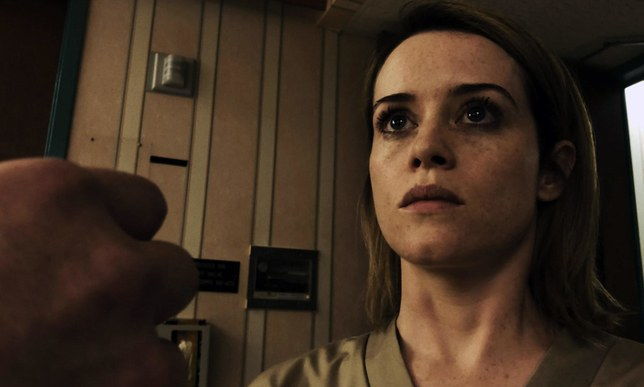‘Unsane’ Shows the True Horror of When a Woman Isn’t Believed

The scariest part of Claire Foy’s new film Unsane, in theaters now, happens right in the middle. By this point, her character (Sawyer) is fully convinced her stalker is posing as an employee at the mental institution she’s detained at. As she’s waiting in line to take her day’s worth of medication, she comes face to face with him—or so she thinks. He’s tall with a scraggly beard; Coke-bottle glasses frame his beady eyes, which seem vacant to most but insidious to her. He greets her warmly, but she scoffs in response, infuriated and petrified that he’s there and no one believes her.
He then pulls something out of his pocket that stuns Sawyer: It’s a letter addressed to her mother’s house, proving he was there, at some point, snooping around. She freaks out—as anyone would—ranting and raving and screaming for help, but no one responds. When the camera pans back to her stalker, the letter’s nowhere to be found, which poses the question: Is this all in Sawyer’s head?
That answer is revealed eventually, but we won’t spoil it for you. Regardless of whether or not she’s telling the truth, how the hospital reacts to Sawyer’s claims is beyond troubling. Despite Sawyer’s repeated attempts to tell the staff she’s in danger, they think she’s lying. She’s sedated and chained to her bed multiple times. The employees patronize her. Other patients provoke her. Instead of actually listening to Sawyer—even for five seconds—they look for ways to discredit her. Any somewhat unruly comment or thing she does, no matter how small, is used as ammunition to deem her crazy, illogical, and senseless. To them, she’s someone who shouldn’t be believed or taken seriously, under any circumstances.
That idea is all too real and familiar in today’s cultural landscape. The New York Times and The New Yorker’s 2017 exposés about Harvey Weinstein launched a sexual assault reckoning, both in Hollywood and around the world. Since then, thousands of women—of various ages, backgrounds, and professions—have come forward with their own stories of sexual harassment. Many of their testimonies share frightening parallels to Sawyer’s in Unsane.
Exhibit A: The woman who accused her peer at Yale University of sexual assault. Yes, the defendant was ultimately found not guilty, but his lawyers’ attempts to gaslight the female accuser are still shocking. They questioned her alcohol consumption, her clothes, the “flirty” texts she sent to the defendant—all to make it seem like the assault didn’t happen. That it was just in her head.
Or how about the slew of actresses who were reportedly blacklisted from Hollywood after rebuffing Weinstein’s advances, like Ashley Judd and Mira Sorvino? Fighting their attacker basically left these women imprisoned—not physically, but professionally. They couldn’t run from Weinstein because his power in Hollywood was too pervasive. What he allegedly did to both of them irrevocably changed their lives and careers, much like Sawyer’s stalker changed hers. He followed Sawyer from Boston to her new town and now—so she thinks—to High Creek Behavioral Health Facility, where, ironically, she went to get help for the trauma she felt because of her stalker. She can’t escape him.
A final example: Rose McGowan, who says she was raped in the ’90s. In 2016, she tweeted that a lawyer told her she’d never win a case against her attacker because she’d done a sex scene in a film—yet another example of the system discrediting a woman into silence.
What Sawyer experiences in Unsane physically embodies the emotional trauma the women of #MeToo and countless others have described. Every time they’re not believed or made to look incompetent or unreliable, they start to feel helpless, as Sawyer does. In Unsane, Sawyer’s anguish manifests into some very terrifying visuals. What we see is exactly what survivors describe feeling every day. The movie puts physical, tangible images to abstract concepts. It puts a face to a feeling, and quite literally shows the abject horror of when a woman isn’t believed. The fear, the paranoia, the self-doubt: It’s all presented in Unsane in excruciating detail. If you’re a survivor, the film might be uncomfortable to watch because of this.
My hope, though, is that this film will send non-survivors, especially those who aren’t familiar with the #MeToo and #TimesUp movements, a clear message: Listen to sexual assault survivors. Fully.

